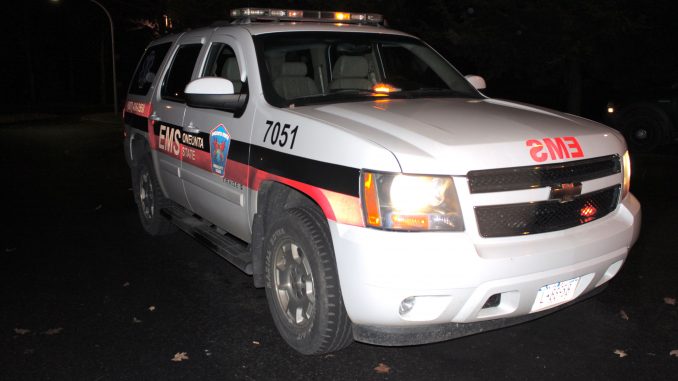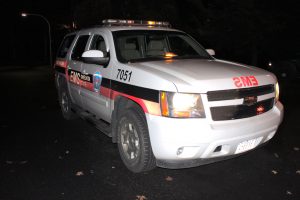
Kate Koenig, Editor-in-Chief

A medical amnesty policy has begun its propositional stages, in aim to have it adapted to the SUNY Oneonta Code of Conduct. The medical amnesty resolution was initiated by SA President Jimmy Johnston, with the goal of presenting it to the college council later this school year.
Medical amnesty essentially provides students with the right to remain protected from disciplinary action in the case of seeking medical attention as a result of illegal actions.
Currently, the SUNY Oneonta campus has no medical amnesty policy. In the college’s code of conduct, it states “An individual’s use of alcohol or any other drugs, on/off campus, which results in a disruption to the campus community, will be considered a violation of this policy.” Students found guilty of a violation are subject to disciplinary action ranging from receiving probation, restriction from representing the school in involvement such as NCAA athletics or academic conferences, or in the case of repeated severe offenses, suspension or expulsion.
Director of Judicial Affairs Amanda Finch elaborated further on college sanctions in response to alcohol- or drug-related offenses on campus, saying that the college’s main goal is to offer sanctions that are “educational in nature,” such as the educational alcohol and drug classes or referrals to programs such as the First Year Experience, volunteer organizations or career development “in order to redirect some of that behavior and get them re-focused on the purpose of being here.”
However, it’s unclear as to whether this is the student body’s perception of the issue. Emergency Medical Technician Karina McKitrick spoke on her experiences in responding to emergency medical calls: “We’ve shown up to scenes where patients are hysterical due to the fact that they’re scared of getting in trouble. Some of them think we’re university police… It’s one of those things where while if they’re scared to call us, or if they’re that hysterical when we get there because they’re scared of getting in trouble, are we really doing any good in this?”
A student who chose to remain anonymous also shared a personal experience she had as a freshman, in which she was put on probation for 6 months after calling the EMS for fear of an alcohol-related emergency. “I had to go to two on-campus meetings or events and report back to [the FYE office] about them …I had already been really involved. I had just gotten into a sorority; I was on Senate since first semester freshman year. …I felt like I did something negative for trying to get help instead of it actually just helping me in the situation.”
On July 20, 2011, Governor Cuomo signed the “Good Samaritan” Medical Amnesty Law to encourage individuals to call 911 for help in drug- or alcohol-related emergencies. On the Medical Amnesty Bill’s website, it states that Medical Amnesty legislation is currently in effect in 10 states, with the unifying cause being “to grant limited immunity from a state’s Minor in Possession of alcohol (MIP) charge in certain circumstances where they make contact with officials during an emergency.” According to this state law for New York, if a minor has become intoxicated with alcohol or illegal drugs and calls for medical help, they cannot be legally penalized.
Edit: Colleges have the right to deliver sanctions to students who violate their policies, but students have no risk of being penalized by the local or state authorities.
Cornell University was one of the first institutions to initiate a policy of medical amnesty for its students in 2002, designed to increase the likelihood that students will call for help in cases of medical emergencies. In a paper by Deborah Lewis and Timothy Marchell of the Gannett Health Services at Cornell published in 2006, it’s stated “…A random sample survey of Cornell undergraduates conducted in the spring of 2000 found that 19% of respondents reported thinking about calling for help because they were concerned about someone who was severely intoxicated, though only 4% actually called for help. …[The second most frequently cited] reason given was because the respondent did not want to get the distressed individual in trouble (3.8%).”
While it’s been rumored that high profile alcohol-related deaths was a significant cause of the passing of the medical amnesty policy at Cornell, Lewis states that the motivation was more that “we wanted to increase the number of students who call for help in alcohol emergencies. We’ve tracked calls to …our campus CUEMS, and what we’ve found is since implementing the medical amnesty protocol, the number of alcohol-related 911 calls on campus have increased substantially.”
An alcohol-related death at Cornell did occur as a result of hazing in 2011 and was highly publicized. The university’s medical amnesty or “Good Samaritan” protocol does provide for eligibility of organizational amnesty, but in this instance it was not received. However, in regards to matters concerning individual amnesty, a graph on the college’s Gannett Health Services website displays a significant increase in calls to campus EMS since 2002, with a decline of patients being transported to the hospital.
Numerous private institutions have medical amnesty policies instated, notably including Yale, Harvard, MIT, NYU, Dartmouth, Princeton and Vassar. Several SUNY schools also have policies in place, including campuses at New Paltz, Albany, Fredonia and Binghamton.
To be officially adopted by the SUNY Oneonta Code of Conduct, Johnston’s resolution on medical amnesty must be voted on by the college council, after being adapted by the Office of Student Development. The college council acts as a neutral entity, consisting of Johnston, the chair of the College (faculty) Senate and members of the community (some of whom include retired faculty members) appointed by the State University of New York.
Yesterday night, the SA Senate voted in favor of the resolution, therefore endorsing it in preparation for Johnston’s proposal to the college council. Johnston sees this as a representation of the voice of the students. “By passing this resolution we can show that it’s a real concern for students across campus.”
Johnston sums up his feelings on the policy with a relatable analogy: “I think of [the medical amnesty resolution] in the same way as how we have condoms in the residence halls; it’s not that the college wants to encourage sex, but it’s something that we know is going to happen anyway, so we want to encourage it to go on in a safe manner. It’s the same with drinking. We know it’s going to happen, so we should encourage that if something goes wrong, we’re going to ensure students will be safe.”
This should happen. Even a single death because someone is too afraid to call for help is one death too many. It’s not as if people are drinking less because they are afraid of getting hurt, people just avoid calling for help because they are afraid of getting in trouble.